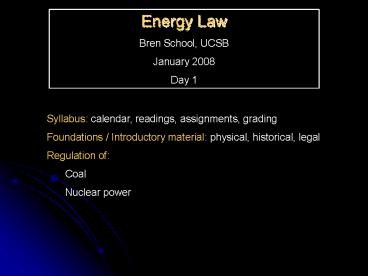Energy Law - PowerPoint PPT Presentation
1 / 51
Title:
Energy Law
Description:
FIRST LAW OF THERMODYNAMICS: 'Energy can neither be created nor destroyed, only ... 1970s Oil crises/OPEC, natural gas shortages; rise of national environmental laws ... – PowerPoint PPT presentation
Number of Views:22
Avg rating:3.0/5.0
Title: Energy Law
1
Energy Law Bren School, UCSB January 2008 Day 1
Syllabus calendar, readings, assignments,
grading Foundations / Introductory material
physical, historical, legal Regulation
of Coal Nuclear power
2
What is energy? From where do humans get
useable energy? Units of measurement
Energy the ability to do work
3
1st 2nd LAWS OF THERMODYNAMICS
FIRST LAW OF THERMODYNAMICS Energy can neither
be created nor destroyed, only converted from one
form to another.
SECOND LAW OF THERMODYNAMICS As energy is
converted from one form to another, the
availability of energy (and the useable amount)
decreases. (a/k/a the law of entropy).
4
ENERGY FORMS/CONVERSIONS
- GRAVITATIONAL
- MECHANICAL
- ELECTRICAL
- THERMAL
- CHEMICAL
- NUCLEAR
5
Electric Generation Fuel Sources,
Worldwide Source IEA Key World Energy Statistics
2001
6
(No Transcript)
7
Extraction of primary source fuels
Regulate externalities
Commercial or residential end use
Transformation into electricity
Regulate competition
8
- ENERGY LAW addresses the development,
distribution and sale of energy resources. - externalities of energy production
- pollution
- safety and health risks (workers)
- regulation of competition
- public utility law
- state ownership
- antitrust/competition law
9
Economic Regulation Evolution of Legal Rules
1837 Charles River Bridge (U.S.) 1859 Edwin Drake
struck oil in western Pennsylvania 1865 First
natural gas utility opened in Fredonia,
NY 1877 Munn v. Illinois 1882 Edisons Pearl St.
Station power plant opened 1887 Interstate
Commerce Act 1880s- Standard Oil rise and
fall Rise of state utility commissions passage
of federal major antitrust legislation 1930s Feder
al Power Act Natural Gas Act Rural
Electrification Act Public Utilities Holding Co.
Act
1930s
10
- Artifacts of Standard Oil U.S. antitrust laws
prohibit - price fixing / collusion
- geographic market divisions
- maintenance of a monopoly through bad acts
- certain forms of price discrimination
- certain forms of resale price maintenance
- mergers that will create firms with monopoly
power
11
- Under traditional rate regulation, how are rates
set?
R Br O
FERC wholesale rates under Federal Power Act
and Natural Gas Act must be just and
reasonable State commissions retail rate
setting
12
- PUBLIC POWER
- Federal Power Agencies (TVA, BPA)
- REA
- Municipal power
- Other parts of the world
13
Electricity Generating Capacity by Industry
Sector and Ownership, as of January 1, 1999
(SourceEIA)
14
- Characteristics of Electricity Industry
- Central station vs. distributed generation
- Absence of storage / balancing requirements
- Grid management issues
- Load balancing / reserves
- Loop flows
- CAOs
- Interties
- Power pools ? ISOs / RTOs / TSOs
15
Economic Regulation Evolution of Legal Rules
1930s Federal Power Act Rural Electrification
Act Public Utilities Holding Co. Act 1970s Oil
crises/OPEC, natural gas shortages rise of
national environmental laws 1978 PURPA
1992 Energy Policy Act of 1992 1990s Restructurin
g in US and Europe 2000/01 California
crisis 2005 Energy Policy Act of 2005 2007 Energy
Security and Infrastructure Act of 2007
16
- Energy Production and Externalities
- Externalities Regn Agencies Notes
- Hydro
- Fossil
- Coal
- Oil
- Natural Gas
- Biofuels
- Nuclear
- Geothermal
- Wind
- Solar
- Wave/Tidal
17
Source CERES, Benchmarking Utility Emissions
(2001)
18
- Coal
- Generates electricity how?
- Extraction issues
- Combustion Pollutants
- Old vs. new plants
- New technologies
- International politics of GHG regulation
- Costs
19
Why do we rely so much upon coal as a fuel for
electric generation? What, if anything, is
wrong with relying upon coal in this way?
Low price Plentiful Stable price
SO2 NOx PM Hg CO2
20
Even within the U.S., the highest emitting plants
emit SO2, NOx, and CO2 at rates several times
that of the lowest emitting plants, on a per-btu
basis.
21
Emissions from coal-fired generation by company.
Source CERES Benchmarking
22
Emissions from coal-fired generation by company.
Source CERES Benchmarking
23
(No Transcript)
24
- Nuclear
- How used?
- Political history
- Externalities?
- Costs
- TMI/Chernobyl
- New designs
- Yucca Mountain
- European waste disposal
25
Nuclear Power Too cheap to meter Ready
Kilowatt
26
Nuclear Fuel Cycle
27
(No Transcript)
28
World Nuclear Reactors
29
- NUCLEAR POWER TIMELINE
- 1946 Atomic Energy Act passed creating AEC
- 1957 Price Anderson Act passed
- 1960-80 Many US nuclear plants constructed
- 1970s increasing anti-nuclear activism
- Three Mile Island accident
- China syndrome
- 1986 Chernobyl
30
High level Nuclear Waste (Dry Cask) Storage
31
High level Nuclear Waste (Wet) Storage (fuel rods)
32
Nuclear Waste (Wet) Storage
33
Conceptual diagram of the Yucca Mountain facility
34
Opposition to Yucca Mountain Disposal Site
35
What is the future of nuclear power? What
factors point toward its resurgence? What factors
point toward its continued dormancy?
36
SOURCE Eurobarometer 200
37
(No Transcript)
38
(No Transcript)
39
(No Transcript)
40
World Dry Natural Gas Consumption, 1980-2000 (in
Bcf), Source US EIA
1980 2000
41
How is natural gas used by its retail purchasers?
World data, source, EIA
42
(No Transcript)
43
(No Transcript)
44
OIL EXTRACTION PRODUCTION
- Regulation of drilling (drilling mud and other
wastes) and refining (air pollution and other
wastes)
45
How did the world oil business change in the
1970s?
46
(No Transcript)
47
(No Transcript)
48
Production by National Oil Companies
49
(No Transcript)
50
- Hydro
- Generates electricity how?
- Externalities?
- UN Commission on Dams
- Costs
51
(No Transcript)

